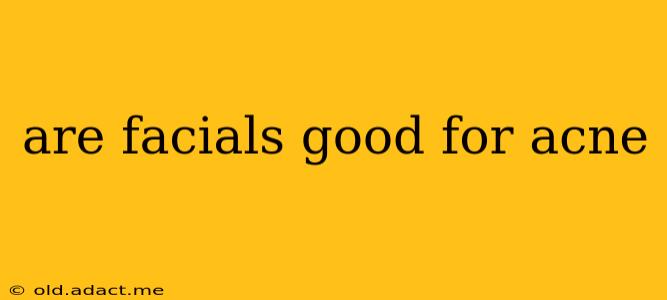Acne. That unwelcome guest that seems to pop up at the most inconvenient times. While many swear by over-the-counter treatments, some find solace (and clearer skin) in facials. But are facials actually good for acne? The answer, like most things skincare-related, is a nuanced "it depends." This comprehensive guide will delve into the potential benefits and drawbacks of facials for acne-prone skin, helping you determine if this pampering treatment is right for you.
What Types of Facials Are Good for Acne?
Not all facials are created equal. Some can even exacerbate acne. The key is to choose a facial specifically designed to address acne-prone skin. Look for facials that incorporate the following:
-
Extractions: A crucial step in many acne facials, extractions involve carefully removing blackheads, whiteheads, and other impurities from pores. This helps prevent clogged pores, a major contributor to acne breakouts. However, it's crucial that extractions are performed by a trained professional to avoid further irritation or scarring.
-
Chemical Peels: These peels use chemical solutions to exfoliate the skin, removing dead skin cells and promoting cell turnover. This can help unclog pores and reduce the appearance of acne scars. The type of peel (e.g., salicylic acid, glycolic acid) will be tailored to your skin's sensitivity and the severity of your acne.
-
High-Frequency Treatments: This therapy uses a handheld device emitting high-frequency electrical current to kill acne-causing bacteria and reduce inflammation. It can be particularly effective for active breakouts.
-
LED Light Therapy: Specific wavelengths of light (like blue light) can target acne-causing bacteria, reducing inflammation and promoting healing.
Avoid facials that are overly harsh or abrasive. Those containing harsh scrubs or aggressive extractions can irritate already inflamed skin, potentially leading to more breakouts.
What are the potential benefits of facials for acne?
When performed correctly by a qualified aesthetician, facials can offer several benefits for acne-prone skin:
- Deep Cleansing: Facials thoroughly cleanse the skin, removing excess oil, dirt, and makeup that can clog pores.
- Improved Skin Texture: Regular facials can improve skin texture, making the skin appear smoother and less bumpy.
- Reduced Inflammation: Certain facial treatments, like high-frequency or LED light therapy, can reduce inflammation associated with acne.
- Minimized Appearance of Scars: Some facials may help reduce the appearance of acne scars over time.
What are the potential drawbacks of facials for acne?
While facials can be beneficial, it's crucial to be aware of the potential downsides:
- Increased Breakouts: Improperly performed extractions or harsh treatments can lead to increased inflammation and breakouts. This is why choosing a skilled, experienced aesthetician is essential.
- Irritation and Inflammation: Even well-executed facials can cause temporary irritation and redness, especially for sensitive skin.
- Cost: Facials can be expensive, requiring a significant financial investment.
Can facials help with cystic acne?
While facials can be helpful for milder forms of acne, they're generally not recommended for severe cystic acne. Cystic acne involves deep, painful, inflamed nodules that require more intensive medical treatment, often involving prescription medications. A dermatologist should be consulted for the management of cystic acne.
How often should I get a facial for acne?
The frequency of facials depends on your skin type and the severity of your acne. For those with mild acne, monthly facials might be beneficial. However, for those with more severe acne, or sensitive skin, less frequent treatments might be more appropriate. It's always best to consult with a skincare professional to determine the best treatment plan.
What should I look for in an aesthetician specializing in acne facials?
Choosing the right aesthetician is crucial. Look for someone who:
- Is licensed and experienced: Ensure they have the necessary qualifications and experience treating acne-prone skin.
- Provides a consultation: A good aesthetician will discuss your skin concerns and recommend a tailored treatment plan.
- Uses high-quality products: They should use professional-grade products specifically formulated for acne-prone skin.
- Maintains a clean and hygienic environment: Hygiene is paramount in preventing the spread of bacteria.
Are there any alternatives to facials for acne?
Facials are just one component of a comprehensive acne treatment plan. Other effective options include:
- Over-the-counter acne treatments: Products containing benzoyl peroxide or salicylic acid can be effective in treating mild to moderate acne.
- Prescription medications: For more severe acne, a dermatologist might prescribe topical or oral medications.
- Lifestyle changes: Maintaining a healthy diet, managing stress, and getting enough sleep can all positively impact acne.
In conclusion, facials can be beneficial for acne, but only when performed correctly and tailored to individual needs. Choosing a qualified aesthetician, understanding the potential benefits and risks, and considering other treatment options are crucial for achieving clear, healthy skin. Always remember that consistent skincare routine, combined with professional treatments, provides the best approach to managing acne.
